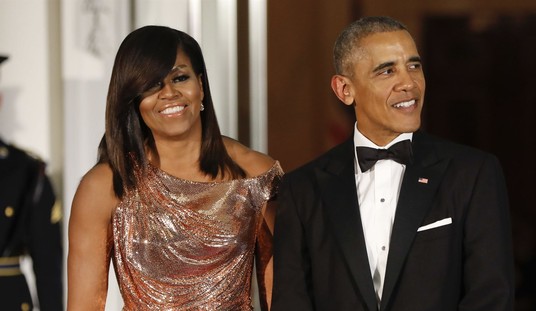Unlike Jeff Goldstein, I’m actually here, so the following will be tempered by a generous interaction with reality. But here goes…
10:05: Folks are wandering in: Neo-Neocon is talking to my wife about hate email; Evan Coyne Maloney just introduced himself to Charles Johnson.
10:06: Announcement to take a seat.
10:07: Andrew Breitbart is at the podium, introducing OSM to the audience, which looks to be about 90 to 100 people, based on a very, very quick and rough table count.
10:10: Breitbart: “Roger and Charles have gone on a shopping spree and linked together 50 of my favorite bookmarks.”
10:12: Breitbart introduces Roger L. Simon.
Roger’s speech explains the origins of the Pajamas Media meme. Here’s the final draft, Roger may have made a few extemporaneous minor changes:
I would like to welcome you all to the launch and – before we ignite our site – say a few words about what was once Pajamas Media and is now OSM – Open Source Media – the new media paradigm for the 21st Century.Pajamas Media, as many of you know, was a name conceived in ironic recognition of a moment in the history of the Internet, that moment when supposedly-amateurish bloggers in pajamas accused a major figure of the mainstream media, an anchorman, no less, of deceiving the American public with forged documents. Despite a sea of denials, that same anchorman has now resigned his position and, a year or so later, some of those same bloggers stand before you today to inaugurate a new and fully-funded online media company.
So times have changed.
But with changing times comes responsibility. We don’t want just to criticize – a short run thing. We want to be constructive – a long run thing. We’re here to stay. And so we needed a new name. But what does that name mean and what’s this new company about?
Open Source Media is a new meeting ground for opinion and news online – a unique home for the growing movement of citizen journalism. It amalgamates over 70 thoughtful webloggers from around the globe with mainstream media journalists sympathetic to our goals. Even though we will emphasize bloggers, this is, to our knowledge, the first deliberate blend of these factions to create the next phase in online media, that new media paradigm. As our numbers increase, we will carefully evolve even further into what we hope will be the global news service of the future, replete with a clear and definitive firewall between news and opinion and detailed fact-checking protocols to go along with that. The Internet, via instant messaging and other technologies, is an ideal place to develop new methodologies to assure the accuracy of content and we welcome everyone’s input in this regard. With hundreds of thousands of potential fact checkers online, we have the potential to be more credible and reliable than mainstream media outlets from CBS to the New York Times. We would also point out that such events as the revolutions in the Ukraine and Lebanon, the Asian tsunami and hurricane Katrina have already shown us that blogs on the scene are fully capable of scooping the mainstream media.
Our criticism of traditional media has been its inability, whether through bias or negligence, to correct itself when the inevitable mistakes occur. (We’ve already made plenty ourselves.) And when mainstream media finally makes corrections, they are usually buried in the back pages of a newspaper, sometimes weeks after the actual error was made. We, at OSM, in our allegiance to openness, take the opposite approach. We will publicize our errors on our front page on a continuing basis, inviting readers, bloggers and other interested parties to engage with us in the search for truth.
But we are only beginning this effort. That blog news service, limited or elaborate, is still in our future. We have other more immediate and developed approaches to news and blogging we will show you in a few minutes. But our guiding principle, now and in the future, will be this openness as practiced by citizen journalists in a free and respectful manner.
When we speak of citizen journalism, we mean journalism created not by elites, as in the top-down traditional media, but from the bottom-up by citizens using their observations and knowledge, informed by a desire to speak honestly.
Not all who have joined this effort are or will be bloggers. Some are professional journalists, prominent writers who work from this position of openness and responsiveness, like Claudia Rosett of the Foundation for the Defense of Democracy and David Corn of The Nation, both members of our editorial advisory board. David also blogs, of course. Others are bloggers of long standing and respect like our Australian editor Richard Fernandez of the Belmont Club… who has flown in from Sydney to be with us today…
[Richard says hello]
…and our Western European Editor Jose Guardia of Barcepundit, who greets us from Barcelona…
[a greeting from Barcepundit on webcam here]
And the Fadhlil Brothers, Omar and Mohammed, who have gained world recognition for their blog Iraq the Model…
[UNFORTUNATELY, A LINK TO OMAR AND MOHAMMED WAS IMPOSSIBLE–ED]
Others will be lesser-known emerging bloggers to whom we make a special commitment to promulgate and encourage their work. We are designing a system for spotlighting them and will feature it on our site in forthcoming months.
Taking our themes from the foundations of democracy itself, we expect all who join us to be willing to have their opinions challenged by the humblest competitor, and to acknowledge the truth quickly and wherever it falls. Citizen journalism at its best means the pursuit of this often-elusive truth above all things, including partisanship and the financial interests of the medium publishing it.
OSM seeks to expand the influence of weblogs by finding and promoting the best of these citizen journalists. We will provide a forum for them, and a platform from which they can increase their financial viability through advertising and syndication. In so doing, we do not intend to overthrow the mainstream media but to enhance it – and maybe change it a little bit by making it more responsive.
We also – and this is especially important – have already affiliated bloggers and journalists across the political spectrum and are continuing to reach out to all sides. This is quite deliberate. Mainstream media frequently fosters partisanship. We intend to foster dialogue. The interactive nature of the Internet facilitates this and we would like to maximize it. We believe that Americans are not as easily categorized politically as the mainstream media would have us believe. Toward that end, OSM has already commissioned some studies in conjunction with Princeton Research. We will be issuing more extensive conclusions shortly, but preliminary results are dramatic. According to our poll, taken by Princeton, a full forty-three percent of Americans are uncomfortable being labeled liberal or conservative – or even moderate.
[shows page from poll]
That’s far more, obviously, than any of the other categories by themselves. Americans, apparently, just don’t like to be labeled; at least not with the labels they’ve been given.
Hybrids aren’t just for cars. We are a nation of political hybrids. The mainstream media, however, has preferred to regard politics as sports, placing all of us in rigid categories like sports fans, as if supporting a political party or point of view were as unified and unthinking as allegiance to the Lakers or the Celtics. OSM questions that.
But speaking of sports, OSM is not going to be all politics, all the time. Far from it. We already have many lifestyle blogs–you’ll be hearing from The Manolo later on! in areas from fashion to spelunking, some of which are going to be featured here today.
On the business side, our demographics are already remarkably high. Our larger blogs frequently get over two hundred thousand visitors a day with many millions of page views a month. From our own internal studies, the average visitor on these blogs has a profile similar to the New Yorker in income and education – six figures in income and graduate to post graduate in education. Also, they are the kind of early adopters that should be attractive to advertisers in terms not just of purchasing power, but also in word of mouth. They are the people who create trends and fashion. But you need not trust us about this. We are already embarked on official studies via Nielsen and iPro that will be made available to you.
But enough of this theoretical palaver, let’s have a look at our site – or what we call our common pages.
My partner in crime, co-founder of OSM, Charles Johnson of the enormously popular Little Green Footballs blog and I will now ignite our site ….
10:25: Charles does indeed ignite the site. “At the top of the page, you’ll see the sexy visage of Alan Greenspan…””Our next study is about a tranvsite turbot. This story will be changing often–very often, in the case of this story…”
“We solicit all of you to give us lots of tips, because we rely on the Blogosphere.”
[Charles ignites site and shows the various parts, how they are done and work…
Top News – blogs meshed with mainstream media
News feeds from Newstex
Blog Jams… shows some examples of private jams we did, talks about forthcoming jams
Links to bloggers and contributors
Where the corrections go!!!]
“I invite you all to log on to the site and check it out at your leisure!”
10:30: Roger’s back on the podium:
RS: And now I would like to acknowledge the folks who will make this operate… Jill Stewart, syndicated columnist and once of the LA Times and New Times and now happily our West Coast Editor… Hillary Johnson – novelist and award-winning editor and no relation to Charles – our news editor…She’s back in LA holding down the fort. Jill and Hillary will work with Belmont Club in Australia and Barcepundit in Spain to keep our site running twenty-four hours a day. Our Director of Technology and resident wizard is Magnus Kempe, formerly of Sapient in Switzerland. And on the business and research sides are Vik Rubenfeld, our Research Director, who is monitoring the political opinion study I told you about and Tom Troja, Emotion Engine founder and CEO who worked before with Decker Communications, Disney Channel and CBS and is now our VP of Marketing and Business Development. If you’re from the advertising and marketing world, we invite you to buttonhole Tom to discuss that side of our business.And now for the first panel.
Elizabeth Hayt, style journalist with the New York Times and Vogue. Kim Weinstein, author of 2003 Beauty Guide to New York. Christa Webber, “Never Teh Bride” author, and editor of Manolo For The Brides Blog.
The Manolo is here–sort of–at least his smoky contra alto voice is, via the P.A. system.
10:40: Elizabeth Hayt seems to be going out of her way to illustrate all that is loathesome about the New York Times and the whole New York liberal inteligencia mindset: “I hate blogs, I don’t read them. I think they’re for rich people with too much time on their hands to vent. And they said, “That’s why we want you here.” “I politically very liberal, but right now, I feel like Ann Coulter in a room of lefties!”
10:55: Manolo’s comments are a beat off, perhaps because of the time delay of beaming in his voice, “It’s like non-sequitors from Alpha Centuri!”, Gerard Van der Leun is overhead commenting.
11:05: Elizabeth Hayt: “We’re going through a period of extreme conservatism and fundementalism in government, and that’s reflected in today’s fashions.”
MUCH hooting from audience–including myself.
11:06: Elizabeth Hayt: “I did attempt to read the Manolo, and I found it unreadable”.
Well, lots of people have found Hayt’s main employer to be much the same.
11:07: Tom Julian, the MC wraps it up–and did a great job of holding it together.
11:09: Roger introduces next panel: John Podhoretz, Richard Fernandez, and David Corn, and mentions that Larry Kudlow and Claudia Rosset are running five minutes late in traffic.
Roger notes that unlike Hayt, these gentlemen are all professional journalists who also blog–“Fancy, that”, Roger says drolly, in response to Hayt’s ant-blog screeds.
11:12: Claudia Rossett arrives.
11:15: David Corn explains various rolls of investigative journalists, pundits, and bloggers. Says that in general, bloggers are too opinion-oriented and not a source of first-line news. For the most, can’t argue with that. But that’s changing.
“Blogging is like going on televivion, and having Bill O’Reilly ask you a question–without getting interupted. It’s a much better way to convey impressions because you’re not being constantly interupted by anchormen and commercials”.
11:19: Richard Fernandez: Blogging allows for additional tracking of what MSM reports, particularly during tragic events. “You can never argue from authority when writing a blogging post…the power ofa blog is to take you forward from a deductive to an inductive to a conclusion. For the first time in history, you have a network that flows both ways from the audience to the players. Where the audience can come up and be the players, and the audience can provide value. It’s the revenge of the guy with a day job.”
(Great soundbyte)
More Fernandez: Because journalists are first-rate journalists, because people who bring their day job experience, they make them look like first-rate amateurs when someone with a day job with relates experience to a topic.
Podhoretz:
For a 100 years, newspaper columnists got a column because they didn’t advance to being an editor. They were shunted off to the side and given columns. If you profit from what I write, you should continue you reading me. When Richard ran the Belmont Club anonomoysly, you read him not because of who he was, but because you agreed with his words.Just because Thomas Friedman goes to Egypt and talks to the finance minister doesn’t mean he brings any more knowledge about Egypt than someone living in Georgia who might also speak Aramaic. The authority comes from the work.
Kudlow asks Corn what’s wrong with journalism returning to its roots, with lots of pundits left, right and center. What’s wrong that?Corn is bemoaning the loss of common culture as media is demassify. “People self-ghettoize…Nobody could do what Chronkite did in 1967 or ’68 when he went to Vietnam and told us the war was lost”.
(That’s a feature, not a bug–Ed)
Podhoretz: “People in the mainstream media once pretended they were balanced. They were speaking from a spectrum that was titled to one side of the political spectrum. It is much more difficult now for the MSM to ignore the voice of conservatives. But the MSM still misdiagnoses elections, all of which has to do with a blindness that remains”. (Lots of a paraphrasing.)
Kudlow; So what I’m hearing is from John and David is that the New York Time online is nothing more than a good liberal blog site!
Rosett: Ultimately Larry, everything is a blog site. Transaction costs have dropped dramatically. In my early days as a journalist, 25 years ago, when all I did was write a few things for a school paper. When I started writing, there was no Google, and I put in a collosal amount of work researching articles.”
Explains how hard it once was to sell a story. Now it can posted in a moment on any Website.
Podhoretz says People had no idea how disfunctional many newspapers are–including those he’s worked for–and are so defensive about admitting that they are literally the first draft of history, “and you know how messy first drafts are”.
(Ala–this post…)
Corn is claiming that blogs slant the facts, unlike MSM.
Rossett compares today’s journalism with “bucket shot journalism” from the 18th and 19th century. “There are sites that you go to for gossip–you don’t expect them to be verified. And there’s sites you go to fact”.
Podhoretz: “The Internet has brought modesty–or it will bring modesty–to the olympian voices of the traditional media” Discussing Charles Johnson’s role in breaking RatherGate by simply typing up an MS Word document.
From outside the Rainbow Room: Demonstrating Muggeridge’s Law, Scott Ott has inadvertently written a neat paraphrase of Elizabeth Hayt’s take on OSM and the Blogosphere.
12:15: Glenn Reynolds (in audience) tells David Corn that if the big media doesn’t care what its customers think they’re going to continue to lose readers–just as Hayt said that she doesn’t care what laypeople think about fashion.
LAST UPDATE: 12:30 to 2:30: Lunch followed in the Rainbow Room proper, followed by speeches from Roger, Judith Miller (introduced by Glenn Reynolds), and Senator John Cornyn (R-TX). I didn’t blog those, but I’ll try to link to a round-up of these speeches when/if I find them.
OK, REALLY LAST UPDATE! Links to bloggers covering the after-lunch speakers here.










Join the conversation as a VIP Member